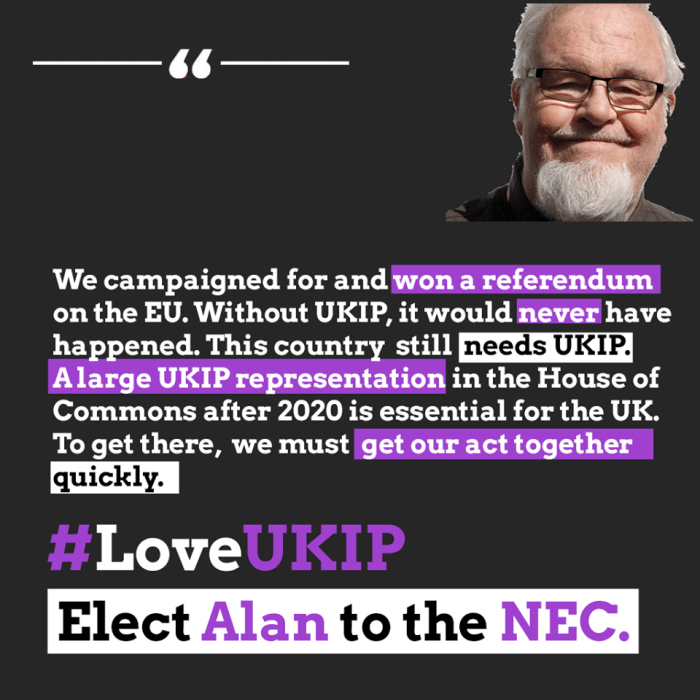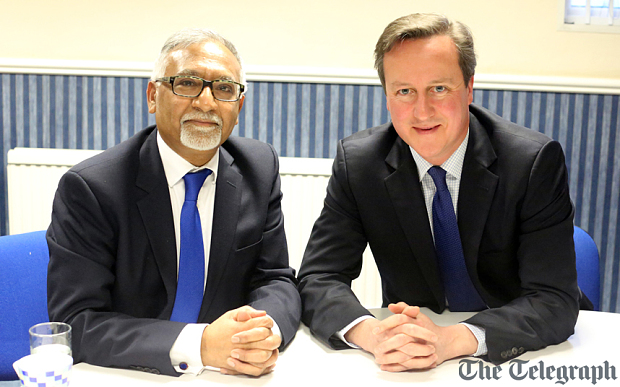 Why am I standing for election to the UKIP’s NEC (National Executive Committee)? It’s a question I sometimes ask myself.
Why am I standing for election to the UKIP’s NEC (National Executive Committee)? It’s a question I sometimes ask myself.
I have been a member of UKIP for 10 years and over that time I have noticed gradual but steady changes in the way the party operates. The UKIP I joined was still, on the surface at least, a libertarian party fiercely defending the principles of free speech. What slowly became apparent to me was there was reluctance on the part of party professionals to encourage those principles within the party membership and structures.
This was at a time when social media was becoming a major weapon in the hands of any political or campaigning group which recognised its potential and UKIP members quickly seized on this means to put their message across to much wider groups than could ever have been contemplated before. The use of social media was never a substitute for the tried and tested methods of contesting elections, especially door to door canvassing, but it was an extremely powerful means by which UKIP could expand its reach to ever more potential members and voters.
Sometime later an official Party Forum was set up on line as a place where only members could discuss issues of the day and, especially, argue out UKIP policy in a relatively secure electronic environment. This Forum did not last long. A comment made on it by a party member got picked up by the press and media and became a brief anti-UKIP story. What was done about this? Instead of dealing with one or two individuals the whole of the Forum was taken down and a valuable channel for membership input was removed.
This was partly due the paranoia that some senior party officers seemed to hold about members getting off the leash and causing the establishment press and media to say unpleasant things about UKIP. It also marked the beginning of a new culture within sections of the party to isolate the rank and file membership of UKIP from the daily activities of the party.
The party officers responsible seemed not to realise that most of the publicity they were trying to avoid, while it might not have gone down well in establishment political circles, was just the thing that UKIP needed to raise its profile among voters and show hard working people, who felt abandoned by our political system, that there was a party which shared their concerns. The closing down of the Forum was a precursor to an unprecedented attack on the use of social media by members. Homily after homily was issued by our wise elders on how much damage free ranging use of social media would do to the party.
I think the worst example I witnessed of this attitude was in a speech made by a high profile new member of the party (soon to be elected an MEP) at the 2014 Spring Conference in Torquay. Party members present were told (I am quoting these figures from memory) that the Party Leader was responsible for 90% of UKIP’s support, the Deputy Leader for 5% and the ordinary members only about 5% if they behaved themselves. I don’t intend to belittle the fantastic invaluable contribution that both those two people were and have been making to the party and the country. I firmly believe that were it not for Nigel and Paul working with the whole membership of UKIP the UK would by now have been consolidated in its colony status within the European Union. However, back in 2014, the speaker went on to castigate the members about the potential liability they could probably be and how they could destroy the party by their free speech I became seriously concerned.
Party officers’ attacks on the use of social media use by members have since continued unabated and increasingly draconian directives on how to behave has been issued to members in general. Indeed, at the September 2016 Bournemouth Conference, in spite of the election of a new Leader who was very much in favour of maximising the benefits of social media use by members, the perceived disadvantages were still trumpeted from the platform.
Thankfully, during the 2014, 2015 and 2016 elections and during the EU Referendum Campaign most members and candidates ignored the supposed party line on social media. But we need the whole party to be moving forward like this and not have permanent braking from the professional party, an increasingly opaque NEC (of which more below) and, I regret, some of our MEPs.
Getting back to the closing down of the Members’ Forum; one of the regular features was the publication of the minutes of the monthly NEC meetings. I can’t remember but they were probably published one month behind after the NEC representatives had approved them at the next meeting. This gave members an insight into the work being done by the people they had elected to NEC. Once the Forum was closed those minutes were no longer available to members.
Things have gone downhill since then. Party members elect representatives to the NEC on a rotating annual basis. These representatives are now apparently prevented, by what mechanism I don’t know, from revealing what goes on inside Fortress NEC. Further, UKIP members are not allowed to know who, on the NEC, voted for or against any motion or rule change. In fact ever decreasing amounts of information seem to leak through to members these days. Those bits and pieces of information that do get handed down are often in the form of prohibitions.
Recent high profile events have been accompanied by email leaks and counter email leaks from the NEC or, more recently, statements, counter statements and “there was nobody there” statements from MEPs.
This, of course, opens the whole operation of the party to rumour and counter rumour and gives free reign to damaging feuds provoked by those who want to see the party become a hierarchical centre party, keeping its members well “on-message” and fitting well into the Westminster Political Bubble. This is no way to run a radical libertarian party which so many hard working voters look to as defenders of their legitimate interests.
So it is time for major, radical REFORM of the internal structures of our party:
The NEC must return to being proper representation for members’ views and input.
The Party Chairman, answerable to the Party Leader, presently chairs the NEC. This promotes an immediate conflict of interests and, more importantly, puts a barrier between the NEC and the Leadership.
It is essential that the NEC elects, on an annual basis, its own chairman from those elected to it by the membership.
The party’s professional officers tend to act as a filter between the NEC and the Party Leader and it is natural that they feel the need to present the NEC’s findings to the Leader is a smoothed out form. This reduces the effectiveness of the NEC and its rôle as a bridge between Leader and members.
It is vital that the NEC should report directly to the Leader and Deputy Leader, if the latter post still exists, without having its deliberations filtered by a Party Chairman.
It is indefensible that NEC representatives are gagged from communicating with the members who elect them. The minutes of the monthly meetings of the NEC must be made available to members as soon as they have been agreed by the following meeting.
It must be made easier for members to replace an under-performing NEC. With only a third of elected posts on the Committee being contested each year change cannot be made at all rapidly. However, some continuity is desirable.
I propose that elections to the NEC are for 2 years rather than 3 as at present. This would require half of the members to step down every year and make the Committee less cut off from members’ concerns.
I do not wish the National Executive Committee to be reduced to a Regional squabble box.
Therefore, I wish to see the preservation of the present arrangement where NEC representatives are elected by the National rather than regional membership.
Regional interests should be represented on the Regional Organisers’ and Regional Chairmen’s meetings (RORC). These meetings should be the arena where regional squabbling (not necessarily an unhealthy activity) should take place. The remit of these latter meetings should be strengthened if necessary. There should be close (meaning direct) liaison between the NEC and RORC with their signed off minutes being mutually shared.
The rôles played by the NEC and the professional officers of the party in matters such as discipline, candidate selection, electoral rankings and vetting procedures need urgent review. I am not going to make suggestions now as I need to study the workings of the committee as an elected member (if members decide to elect me) before forming a final opinion.
Finally, as a party that presses for proportional representation in local and national elections it is unfortunate that our internal elections are still conducted by the old fashioned “first past the post system.” A member may want to vote for a promising new candidate but may be concerned that by doing so she could allow a candidate whose views she holds unsuitable to overtake a safer candidate. This can result in bland not very innovative candidates being elected at the expense of innovative risk takers.
I am therefore floating the idea that all internal elections which have the whole of the National membership as electors should be conducted by single transferable vote(STV).
Under STV it is easier to support new candidates with a fall back to other choices if your first preference fails to make it. STV is much closer to true proportional representation than the alternative vote system used in many devolved elections in Great Britain. STV maintains the constituency link. STV allows the voter to vote for the person rather than the party. I’ve fought elections under the STV system and, apart from very long counts (let the party officers earn their money), it’s a simple efficient way to vote.
So I, Alan Love, am asking for your vote in the 2016 UKIP NEC Elections. I and candidates such as Ryan Waters, Victoria Ayling, Anish Patel and Michael McGough will be seeking to bring radical reform to the internal structures of our party and help bring our membership back into the heart of decision making in our party.
Reform, Renew and Re-energise
Let’s take our UKIP back!
 The UK is lurching towards a constitutional crisis as more and more of the political elite join with their chums on the more disgraceful side of the legal profession to attempt to block the people’s verdict on Leaving the European Union . The recent judgement on Parliament needing to approve the triggering of Article 50 has threatened to plunge the United Kingdom into anarchy. This is exacerbated by the apparent ignorance of how the law works by three senior judges.
The UK is lurching towards a constitutional crisis as more and more of the political elite join with their chums on the more disgraceful side of the legal profession to attempt to block the people’s verdict on Leaving the European Union . The recent judgement on Parliament needing to approve the triggering of Article 50 has threatened to plunge the United Kingdom into anarchy. This is exacerbated by the apparent ignorance of how the law works by three senior judges.
